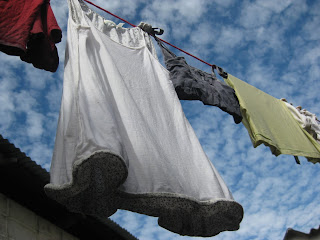
Today I did a monstrous load of laundry. For the past two weeks I had successfully ignored the increase in empty hangers in my “closet” but when my laundry basket began to overflow last night I decided today i’d roll up my sleeves and get it over with. Laundry is an internal struggle for me. Every time I’m thirty minutes in to washing my clothes, when my arms start to ache and I look up to see only half of my clothes hanging to dry, half still wet in a huge bucket with detergent, I think to myself, “next time I’m gonna pay someone to do this for me.” Then comes the next week and I once again decide to save the Q20 ($2.50) and do laundry on my own.
The worst part of it all is that I do an awful job at washing my own clothes. Ever since my first load when I ruined a shirt, a pair of slacks and damaged my jeans I decided hand washing clothes in a pila is not something I’m good at. I do slightly blame my Alotenango host mother for not being the best at explaining the proper technique. We started out standing at the pila. First we selected an item of clothing and placed it in the left pila basin (the side with little cement ripples). Then she began to dampen the clothes by taking water from the center well with a little plastic pan/bucket and dumping the water onto the clothes. Then lathered up the clothes with a bar of soap and began to drag the clothes over the cement basin to get the dirt out. During this “dragging” step my host mom, Dona Paula, clasped the clothing tightly and thrust the clothes back and forth, back and forth. To me it looked like she was harshly rubbing the clothes against the cement pila basin but it turns out she barely would nick the cement. When it was my turn to wash clothes my misinterpretation of her thrusts lead to numerous holes in my clothing. This was especially traumatic because I had come to Guatemala with so few clothes it wiped out about 1/6 of my stock. To this day I am a little upset that Peace Corps didn’t give us life skills training on how to hand wash clothes in the pila. Even a little cliffs notes explanation would have saved me some of my precious clothing.
Maybe at some point in my service i’ll cave and pay someone with a little more experience in pila practices to do my laundry. Until then, I maintain that it is un-Peace-Corps-like to not partake in a daily routine that all other females in my town have to do. But, I’ll be honest and say, I can’t wait for the day that i’ll once again be able to shove a load in the washer and come back 30 minutes later to clean clothes.






